These Amendments Would Open the Door to a Dangerous Global Health Bureaucracy
Subscribe for free to the America First Report newsletter.
(Brownstone)—The Covid pandemic gave the World Health Organisation and its partners unprecedented visibility and a tremendous amount of “soft” power to shape public health law and policies across the world. Over the past year or so, the WHO has been pushing hard to consolidate and expand its power to declare and manage public health emergencies on a global scale.
The primary instruments for this consolidation are a WHO Pandemic Accord and a series of far-reaching amendments to existing International Health Regulations (IHR). The target date for finalising both the IHR Amendments and the new Pandemic Accord is May 2024.
The net effect of the proposed text for the pandemic accord and the proposed amendments to the International Health Regulations, would be to create a legal and financial basis for the emergence of an elaborate, internationally coordinated bio-surveillance regime and significantly strengthen the authority of the World Health Organisation to direct and coordinate the international response to global and regional public health threats.
It is not entirely clear why the WHO decided to negotiate a separate pandemic treaty that overlaps in significant ways with the proposed IHR amendments. In any case, most of the far-reaching changes to global health regulations are already contained within the IHR amendments, so that is what we will focus on here.
Even if the WHO failed to get a new pandemic treaty passed, the proposed amendments to International Health Regulations would be sufficient by themselves to confer unprecedented power on the WHO to direct international health and vaccination policies in circumstances deemed by the WHO to be a “public health emergency of international concern.”
The WHO wants the IHR amendments to be finalised on time for next year’s World Health Assembly, scheduled for 27 May – 1 June 2024. Assuming the amendments are approved by a simple majority of the delegates, they will be considered fully ratified 12 months after that, unless heads of State formally reject them within the designated opt-out period, which has been reduced from 18 to 10 months.
If ratified, they will come into effect two years after their announcement at the May 2024 World Health Assembly (i.e., around June 2026), as stipulated in the annex to Amendments to the International Health Regulations (2005) agreed to on 28th May 2022.
In other words, revisions to the International Health Regulations will pass by default rather than by formal acceptance by heads of State. The silence of heads of State will be construed as consent. This makes it all the easier for the revised IHR to pass without proper legislative scrutiny and without a public debate in the States that are subject to the new legal framework.
To get a flavour of how these changes in international law are likely to impact the policies of governments and citizens’ lives more broadly, it is sufficient to review a selection of the proposed amendments. While we do not know which of the amendments will survive the negotiation process, the direction of travel is alarming.
Taken together, these amendments to International Health Regulations would push us in the direction of a global public health bureaucracy with limited democratic accountability, glaring conflicts of interest, and significant potential for systematic harm to the health and liberties of citizens.
The amendments discussed below are drawn from a 46-page document hosted on the WHO webpage entitled “Article-by-Article Compilation of Proposed Amendments to the International Health Regulations (2005) submitted in accordance with decision WHA75(9) (2022).” Because these changes are being negotiated largely outside the frame of national electoral politics, the average citizens is barely aware of them.
Should these amendments come into force, States will be bound by international law, in the event of a public health emergency (as defined by WHO) to follow the playbook of health policies determined by the WHO and its “emergency committee” of “experts,” leaving far less scope for national parliaments and governments to set policies that diverge from WHO recommendations.
Insofar as national States formally consent to the IHR amendments, their sovereignty would remain intact, from a legal perspective. But insofar as they are binding themselves to dance to the tune of political actors outside the scope of national politics, they would clearly lose their freedom to set their own policies in this domain, and health policy “gurus,” instead of representing their fellow citizens, would represent a global health regime transcending national politics and operating above national law.
Under a globally coordinated public health regime, activated by an international public health emergency declared by the WHO, citizens would be vulnerable to errors committed by WHO-nominated “experts” sitting in Geneva or New York, errors which could replicate themselves through a global health system with little resistance from national governments.
Citizens have a right to know that the amended regulations as they stand would give unprecedented power to a WHO-led global health regime and, by implication, its most influential financial and political stakeholders like the World Economic Forum, the World Bank, and the Bill & Melinda Gates Foundation, all of which are largely beyond the reach of national voters and legislators.
There are dozens of proposed amendments to the 2005 International Health Regulations. Here, I will highlight eight changes that are of special concern because of their implications for the independence of national health regimes and for the rights of citizens:


